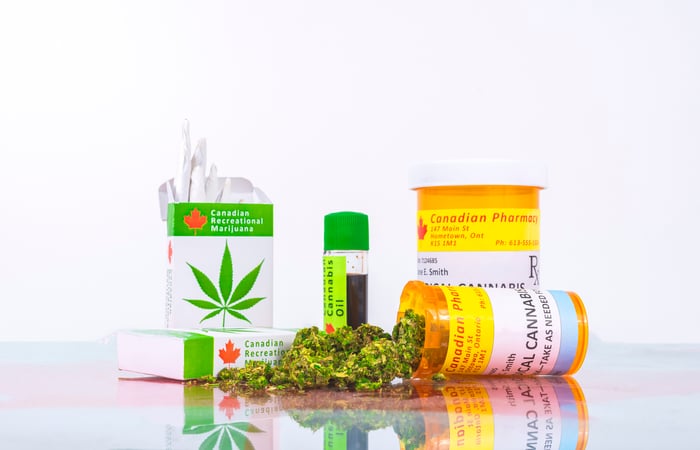The countdown is underway. In less than four months -- Oct. 17, 2018, to be precise -- it will officially be legal for adults in Canada to purchase marijuana. In becoming the first developed country in the world to give the green light to recreational weed, Canada has opened the door to an industry that could now see a $5 billion annual windfall of sales.
In anticipation of this long-awaited vote, and, of course, these delectable sales figures, Canadian pot growers have been busy expanding their capacity as quickly as their wallets will allow. Some growers have seen their projected peak production soar by more than 400% just since the year began, all in an effort to secure long-term supply deals, forge emotional attachments with consumers, and lay claim to as much market share as possible when the proverbial green flag waves in mid-October.

Image source: Getty Images.
The alcohol industry is feeling a bit woozy, and rightfully so
But not every industry is having a good time with the ascension of the legal cannabis industry. In particular, the alcohol industry could be facing the real prospect of losing sales to legal cannabis throughout North America in the years to come.
One piece of evidence that suggests spirit and beer manufacturers are in trouble is the recent release of the "Monitoring the Future" survey in the United States. Whereas the survey found that the perception of cannabis had improved significantly over the past four decades among 12th-grade students, the percentage of 12th-graders who believed their parents would disapprove of weekend binge drinking actually rose modestly since 1976-1979.
In fact, the real possibility of users substituting cannabis for alcohol is one reason why investment firm Cowen Group (COWN), which is arguably more bullish than any other investment firm on the legal marijuana industry, increased its long-term outlook on marijuana sales by 50%, or $25 billion, to $75 billion. It's worth pointing out that Cowen's original estimate calling for $50 billion in annual sales only ran until 2026, and the new estimate extends until 2030. Still, that's a lofty target for an industry that did "only" $9.7 billion in legal sales in 2017, according to ArcView Market Research.
Another red flag came in early May, when Molson Coors Brewing (TAP 0.55%) delivered its first-quarter operating results. Sales for the beer giant declined 2.5% in Canada, an unsightly 5.8% in the U.S., and lost their fizzle in Europe and other international markets, too. Excluding a number of one-time items, Molson Coors' adjusted profit fell about 40% shy of analysts' expectations, and Wall Street responded by shellacking shares of the company, sending it to its worst single-day performance in 13 years.
But as the old saying goes: If you can't beat them, join them.

Image source: Getty Images.
Molson Coors is looking to partner with a Canadian cannabis producer
According to a report late last week from BNN Bloomberg, Molson Coors, which is reliant on Canada and the U.S., has been in discussions with at least four Canadian marijuana companies, including Aurora Cannabis (ACB -1.15%) and Aphria (NASDAQOTH: APHQF), with the intent of making an investment in a pot company, as well as collaborating on cannabis-infused beverages. As you've probably already guessed, neither Molson Coors, nor the companies mentioned in BNN Bloomberg's report, would comment on the discussions.
According to Vivien Azer, the senior analyst at Cowen responsible for covering the marijuana, tobacco, and alcohol industries, Molson Coors currently controls 33% of Canada's beer market, albeit that's down from a 40.5% share back in 2008. With sales declining worldwide, and especially in its core markets, it has little choice but to consider a strategy that allows it access to the fast-growing, and now legal, Canadian weed industry.
Aurora Cannabis and Aphria are logical targets for Molson Coors given their strong production potential and superior distribution channels, relative to many of their peers. Aurora Cannabis, assuming it completes its $2.5 billion, all-share deal to acquire Ontario-based MedReleaf, should have the potential to generate 570,000 kilograms of annual production when at full capacity. Meanwhile, Aphria is expected to produce 255,000 kilograms at full capacity, but did acquire Nuuvera earlier this year, which greatly expands its international reach via exports.
I'd say the chances appear pretty high that one of these two growers is going to be Molson Coors' infused-beverage partner, and therefore receive a healthy investment from the beer giant.

Image source: Getty Images.
Molson Coors won't be alone
However, investors should be aware that Molson Coors isn't going to be the only alcohol giant in the marijuana space, or even the only company working on cannabis-infused beverages.
In late October of last year, Constellation Brands (STZ 0.78%), the maker of Corona beer and other spirits, announced that it was taking a 9.9% stake in Canopy Growth Corporation (CGC 1.28%) for approximately $190 million. Though Canopy Growth has been tight-lipped about its production, it'll likely have the potential to deliver around 500,000 kilograms annually, once at fully capacity. Constellation and Canopy are expected to partner on a number of products, with Canopy Growth also leaning on Constellation's broad-based marketing expertise. So far, at least based on share price, Constellation Brands' investment in Canopy Growth has paid off handsomely.
Additionally, we're also seeing marijuana companies directly tackle the cannabis-infused beverage market. Somewhat recently, The Green Organic Dutchman announced that it was planning to build a 40,000-square-foot facility devoted to product development and pilot manufacturing. Among the products it's eager to test are novel beverages infused with cannabinoids for the Canadian and international markets.
The infused beverage market could certainly offer a lot of growth, but it'll likely face a lot of competition very soon. While I certainly don't blame Molson Coors for considering an investment in a Canadian pot stock following its dreadful first-quarter report, I don't anticipate it'll provide enough of an operating spark to move the needle much, at least for the first few years.





